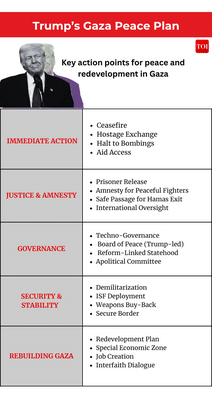Pakistan has formally distanced itself from the 20-point Gaza peace plan unveiled by US President Donald Trump, with country’s foreign minister and deputy prime minister Ishaq Dar telling the national assembly that the final proposal presented by the US was not endorsed by Pakistan or fully representative of the original draft prepared by a group of Muslim and Arab countries.
“I made it clear that the 20 points that President Trump made public are not ours. Changes were made to our draft. I have the record,” Dar said, emphasising that “there is no room for politicking” on the issue.
Dar explained that the plan took shape during a meeting between Trump and foreign ministers of eight countries - Pakistan, Jordan, the UAE, Indonesia, Turkiye, Saudi Arabia, Qatar, and Egypt - on the sidelines of the 80th UN General Assembly session. He said the group had prepared a counter-draft to the US proposal, focusing on an immediate ceasefire, humanitarian aid, and an end to the ongoing bloodshed in Gaza.
While Prime Minister Shehbaz Sharif initially welcomed the peace plan and reiterated support for a two-state solution , the endorsement drew sharp criticism at home. Many in Pakistan labelled it a “surrender” and questioned the absence of a clear roadmap to Palestinian statehood in the US version of the plan.
Dar highlighted key differences between Pakistan’s draft and Trump’s final proposal, particularly regarding the extent of Israeli withdrawal and the disarmament of Hamas. Pakistan’s position called for a complete withdrawal of Israeli forces from Gaza, while the US proposal suggested a phased withdrawal linked to the release of hostages.

“President Trump's committee also came and open talks were held on what they wanted. They gave us a 20-point proposal,” Dar said. Over the next 24 hours, the eight countries exchanged revised drafts informally. “We were exchanging hard copies in hotel rooms,” he recalled.
Dar said while there was an initial effort to seek joint signatures from all foreign ministers, consensus on that point was not reached. After Trump's meeting with Israeli PM Benjamin Netanyahu on September 29, the US publicly announced the 20-point plan. Dar later learned from the Saudi foreign minister that some of the urgent proposals by the eight countries had been accepted, while others were left for further dialogue.
He reaffirmed Pakistan’s long-standing policy on Palestine. “Pakistan’s policy on Palestine remained the same as that of Quaid-i-Azam Mohammad Ali Jinnah. There has not been any change nor will there ever be,” Dar said, reiterating support for an independent Palestinian state with Al Quds Al Sharif as its capital.
(with inputs from agencies)
“I made it clear that the 20 points that President Trump made public are not ours. Changes were made to our draft. I have the record,” Dar said, emphasising that “there is no room for politicking” on the issue.
🚨#BREAKING: Pakistan takes a massive U-turn, rejects Trump’s Gaza Peace Plan.
— The Alternate Media (@AlternateMediaX) October 3, 2025
After meeting at the White House, Asim Munir & Shehbaz Sharif backtrack.
Pak Dep. PM/FM Ishaq Dar: “Trump’s 20 points are not our points.”#Pakistan #Trump #Gaza #POK #USA pic.twitter.com/o23WNpDShP
Dar explained that the plan took shape during a meeting between Trump and foreign ministers of eight countries - Pakistan, Jordan, the UAE, Indonesia, Turkiye, Saudi Arabia, Qatar, and Egypt - on the sidelines of the 80th UN General Assembly session. He said the group had prepared a counter-draft to the US proposal, focusing on an immediate ceasefire, humanitarian aid, and an end to the ongoing bloodshed in Gaza.
While Prime Minister Shehbaz Sharif initially welcomed the peace plan and reiterated support for a two-state solution , the endorsement drew sharp criticism at home. Many in Pakistan labelled it a “surrender” and questioned the absence of a clear roadmap to Palestinian statehood in the US version of the plan.
Dar highlighted key differences between Pakistan’s draft and Trump’s final proposal, particularly regarding the extent of Israeli withdrawal and the disarmament of Hamas. Pakistan’s position called for a complete withdrawal of Israeli forces from Gaza, while the US proposal suggested a phased withdrawal linked to the release of hostages.
“President Trump's committee also came and open talks were held on what they wanted. They gave us a 20-point proposal,” Dar said. Over the next 24 hours, the eight countries exchanged revised drafts informally. “We were exchanging hard copies in hotel rooms,” he recalled.
Dar said while there was an initial effort to seek joint signatures from all foreign ministers, consensus on that point was not reached. After Trump's meeting with Israeli PM Benjamin Netanyahu on September 29, the US publicly announced the 20-point plan. Dar later learned from the Saudi foreign minister that some of the urgent proposals by the eight countries had been accepted, while others were left for further dialogue.
He reaffirmed Pakistan’s long-standing policy on Palestine. “Pakistan’s policy on Palestine remained the same as that of Quaid-i-Azam Mohammad Ali Jinnah. There has not been any change nor will there ever be,” Dar said, reiterating support for an independent Palestinian state with Al Quds Al Sharif as its capital.
(with inputs from agencies)
You may also like

Deadly twist of fate meant Manchester terror attack victim was at synagogue

Storm Amy: Worrying photos show swimmers in dangerous high waves despite weather warning

Kate Middleton reveals Prince Louis' dream future plans but warns it'll be hard work

Rhea Chakraborty says 'Satyameva Jayate' as she gets her passport back after 5 years

Cillian Murphy's Steve co-star Jay Lycurgo's roles from Batman to Peaky Blinders







